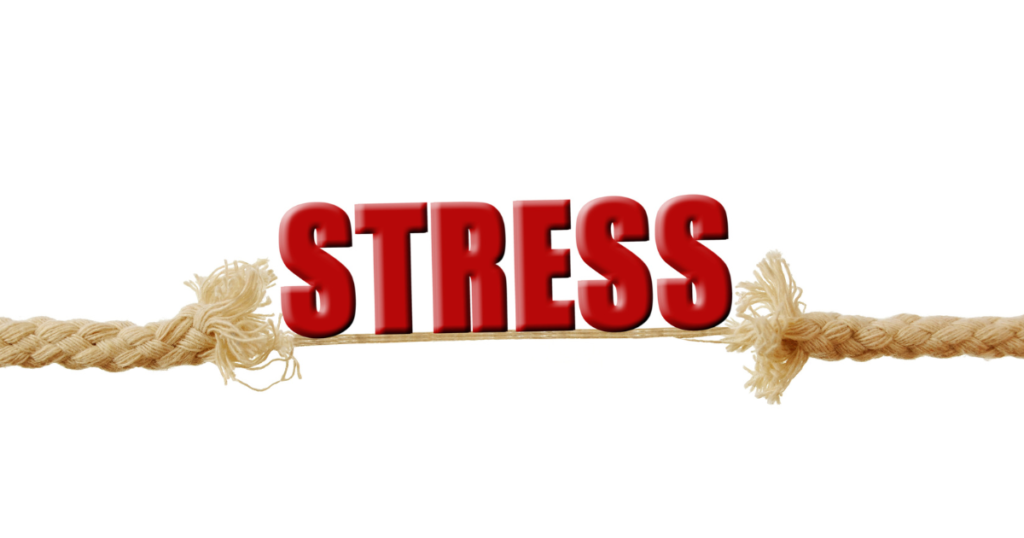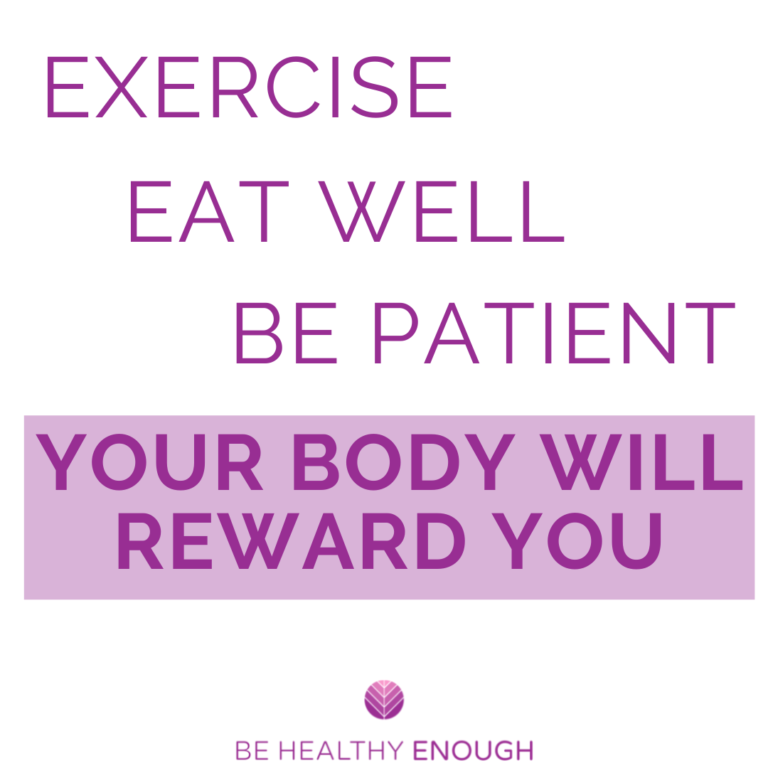Why Stress Is Killing Your Weight Loss and Belly Fat Goals

Weight gain, especially around the abdomen, is one of the top complaints women have when they transition into menopause. Even women that don’t gain weight, see changes in where the fat is deposited. Understanding why this weight gain occurs can help women come to terms with the biological process of menopause rather than thinking of it as something to be dreaded and battled. Women need to know that the symptoms of menopause are something all women go through, you are not alone and what is happening isn’t because of something they are doing or not doing.
I’ve covered a number of the top things that affect weight gain and belly fat; muscle mass, sleep, nutrition, gut health. Today let’s dig into one of the top contributors – STRESS
In small doses, stress can be beneficial; it not only tunes your brain but also improves your health and performance. Chronic stress, however, is the complete opposite of beneficial. In today’s fast-paced world, stress has become an all-too-common part of our lives. From work pressures to personal responsibilities, stress can wreak havoc on our overall well-being. One area where stress can have a particularly detrimental effect is on our weight loss goals. And you are killing yourself to exercise more and eat less…that’s stress on top of stress. Despite our best efforts to eat healthy and exercise regularly, chronic stress can sabotage it all.
Legs dig deep into the connection between stress and weight loss and discuss how you can overcome this barrier to achieve your desired goals.
What happens when we’re stressed:
When we experience stress, Your adrenal glands — triangle-shaped organs at the top of your kidneys — release a hormone called cortisol, also known as the stress hormone. Cortisol triggers a fight-or-flight response, preparing the body to face a perceived threat.
Think of cortisol as nature’s built-in alarm system. It works with certain parts of your brain to control your mood, motivation, and fear.
Cortisol is not all bad in fact it helps with many things your body does. For example, it:
- Manages how your body uses carbohydrates, fats, and proteins
- Keeps inflammation down
- Regulates your blood pressure
- Increases your blood sugar (glucose)
- Controls your sleep/wake cycle
- Boosts energy so you can handle stress and restores balance afterward
Again, it’s not a bad hormone. It can be helpful in acute situations; like when you have to give a presentation or run away from that saber tooth tiger . The problem is chronic stress leads to persistently high levels of cortisol, which can have a VERY negative effect on our bodies.
After the pressure or danger has passed, your cortisol level should calm down and your body will get back to doing its normal functions; digestion, heart beat, blood pressure, et. It shut all of those down so it could have what it needed to take on that saber tooth tiger.
But what if you’re under constant stress and the alarm button stays on? It can derail your body’s most important functions. It can also lead to a number of health problems, including:
- Anxiety and depression
- Headaches
- Heart disease
- Memory and concentration problems
- Problems with digestion (leading to gut health issues which I cover in another deep dive)
- Trouble sleeping Additionally, stress can affect your sleep patterns, and inadequate sleep has been linked to weight gain and obesity. (read my deep dive into why sleep is vital to weight loss) The combination of a sluggish metabolism and poor sleep quality can make it challenging to achieve your weight loss goals.
- This is the big “listen up” moment…under constant stress, cortisol levels remain high regardless of the time of day. Because our body is in a stress mode it wants to have all the energy it possibly can. Guess what energy is to the body, FAT. So chronic stress can cause excess fat storage . And it gets stored deep in the abdomen (visceral fat). Because deep abdominal fat has greater blood flow and four times more cortisol receptors so it can be used for easy energy. That’s why when there is too much cortisol in your body, it goes right to your belly.
Did that all make sense…STRESS is a big cause of belly fat they even have a term called “stress belly”
While I have your attention here are some things that may require a doctor’s visit.
Other causes of too much cortisol
A nodule (mass) in your adrenal gland or a tumor in the brain’s pituitary gland can trigger your body to make too much cortisol. This can cause a condition called Cushing syndrome. It can lead to rapid weight gain, skin that bruises easily, muscle weakness, diabetes, and many other health problems. Don’t be scared. As Arnold would say…it’s not a tumor (or may not be) Anyone else a Kindergarten Cop movie fan?
Not enough cortisol
On the other extreme if your body doesn’t make enough of this hormone, you could have a condition doctors call Addison’s disease, Addison’s disease, also called adrenal insufficiency, is an uncommon illness that occurs when the body doesn’t make enough cortisol. When the body is under stress (e.g. fighting an infection, exercise, starving…), this deficiency of cortisol can result in a life threatening Addisonian crisis which is a life-threatening situation that results in low blood pressure, low blood levels of sugar and high blood levels of potassium. It requires immediate medical care. I’ve never known a person to have this but I have known dogs that get it.
Usually, the symptoms appear over time. They include:
- Changes in your skin, like darkening on scars and in skin folds
- Being tired all the time
- Muscle weakness that grows worse
- Diarrhea, nausea, and vomiting
- Loss of appetite and weight
- Low blood pressure
The reason I’m sharing this is to “stress”, pun intended, that you talk to your doctor if you’ve tried everything. I am right in the middle of a bunch of testing to figure out how to treat my menopause symptoms; hot flashes and terrible sleep and I just did a cortisol test. It’s easy, you spit into containers 4 times throughout the day and send the results in. If you’re doctor won’t do this you may have to pay out of pocket. I’ve used this site before called Your Lab Works Just type in cortisol in the search in the link HERE
Why is this more of a problem when we hit menopause?
This was VERY eye opening to me. I had no idea that menopause changed this, not surprised, it changes a lot of things in our bodies.
Estrogen – Cortisol Connection
Estrogen has anti-cortisol properties, which help the body counteract some of the negative effects of cortisol. So as estrogen decreases, so do its cortisol-fighting superpowers. This means that if your body was able to handle some of the excess day-today-stress before, it may not be able to handle it quite as well now, which translates into excess belly fat.
Stay until the end because I’ll give you some tips to reduce your stress. Because I have a few more things to convince you to focus on reducing your stress.
Trying to deal with stress and not feeling well can lead to a host of bad eating behaviors.
Eating to feel good I do this, I’ve had a stressful day and I want something ooey gooey. These comfort foods provide temporary relief by triggering the release of feel-good neurotransmitter Seratonin
Mindless Snacking When stressed, many turn to food as a form of distraction. Sometimes if I have a tough task to take on I’ll distract myself and go pantry grazing. This can lead to mindless snacking, where we eat without paying attention to portion sizes or nutritional content.
Unfortunately, indulging in unhealthy foods as a coping mechanism to feel good or a distraction of course can lead to weight gain and hinder your weight loss progress.
Chronic stress can drain your motivation and energy levels, making it difficult to find the drive to exercise or maintain a healthy lifestyle. THIS IS A BIGGY and may be your “tipping point” Has anyone else read that book? When I ask women over 50 what the biggest obstacle to leading a healthy lifestyle; MOTIVATION always is at the top
What to do about stress?
Ok now lets dig into ACTIONS. I am an action girl. What’s the point of learning all this if you aren’t going to take some action?
BIG question first…can you reduce the impact things have on your stress? Can you get some help? Can you say no to things that cause you stress?
If not, stress is a part of your life for now. Find ways to manage it (if you want to lose weight these are a MUST)
a. Practice stress management techniques such as deep breathing, meditation, yoga, or engaging in hobbies that help you relax and unwind.
b. Regular Exercise: Exercise helps reduce stress levels and releases endorphins, the body’s natural mood enhancers. Be careful of exercise though. Intense exercise for more than 40 minutes causes an increase in cortisol. So if your goal is to keep cortisol in check, keep your workouts shorter or if you are in a very stressful time, I can’t believe I am going to say this, intense exercise may need to stop and you use your exercise time to focus on practicing more mindful workouts such as light walks, stretching, just moving your joints. Don’t stop moving because motion is lotion for your joints and rest is rust.
Also, follow your bodies normal cortisol levels and do your intense exercise in the morning and light exercise in the evening. Too intense at night could disrupt your sleep
c. Speaking of Sleep: Make sleep a priority and aim for 7-9 hours of quality sleep each night. Create a calming bedtime routine and limit exposure to electronic devices before bed. Shut down your work stuff early so you aren’t waking up a night worried (listen to my deep dive on sleep to get more)
d. Healthy Eating Habits: Avoid turning to unhealthy foods as a coping mechanism. Find something ELSE. I call these Be Healthy Enough options. As opposed to turning to cookies or sweets in the afternoon grab a handful (only 1) of nuts or have some protein or fruit. Of course overall a good rule thumb is to focus on eating a balanced diet rich in fruits, vegetables, lean proteins, and whole grains.
e. Get some help. It doesn’t have to be a professional although I highly recommend this. It really saved me at some high stress times of my life; family problems, leaving my job at HP, Breast Cancer. Reach out to friends, family, or a support group to share your feelings and concerns can really help. Sometimes, talking about stress can help alleviate its impact.
Conclusion
While stress is an inevitable part of life, it’s crucial to recognize its negative influence on our weight loss goals. By understanding the connection between stress and weight loss, and implementing effective coping strategies (or maybe realizing it’s time to talk to your doctor or get tested), you can regain control over your health and achieve your desired weight loss goals. Remember, self-care and stress management are key components of a successful weight loss journey. Prioritize your mental and physical well-being, and the pounds will follow suit.
Need some help with exercise? Try one or more of my workout programs FREE for 7 days. Click HERE to view my workout library first.






